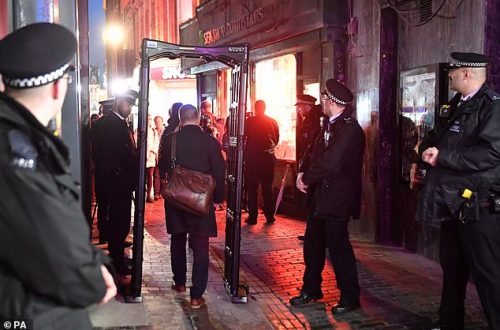The Police Federation have had to remind the Government about the open case involving the murder of a police officer in 1984. Ministers could have appraised themselves of the basic facts by visiting the BBC website’s On This Day feature:
A police officer has been killed and ten people injured after shots were fired from the Libyan People’s Bureau in central London.
WPC Yvonne Fletcher had been helping control a small demonstration outside the embassy when automatic gunfire came from outside.
She received a fatal stomach wound and some of the demonstrators were also severely injured.
WPC Fletcher, 25, died soon afterwards at Westminster Hospital.
The gunman was never caught. It is believed he was smuggled out of the country under the cover of diplomatic immunity, which – initially revoked – had to be restored after the Libyan army surrounded the British Embassy in Tripoli.
But now the Foreign Office has agreed to send UK police officers to train their counterparts in Libya. After much (denied) dealing, Libyan officers have already visited London to study forensic techniques.
But chair of Police Federation, Paul McKeever, has objected, calling the decision to train Libyan officers as “naive and insensitive”. He told the Press Association:
“Whilst it may be customary for countries to look to the UK police to provide expertise and training I find it incredible that the Foreign Office has been so naive and insensitive imposing this particular request on the National Policing Improvement Agency.
“This will further anger and disgust rank and file officers who believe Libya should and could be more proactive in securing the arrest of Pc Fletcher’s killer. This one way traffic, where we do all the giving and they just take, must stop.”
It certainly must. But there is a bigger issue here: What are the Libyan police used for and what will the training we give them help them achieve?
Amnesty International provides some clues in it’s 2008 report on Human Rights in North Africa and the Middle East. On Libya Amnesty notes:
In Libya, any perceived criticism of the principles of the al-Fateh Revolution of 1 September 1969, which brought Colonel Mu’ammar al-Gaddafi to power, is likely to be punished. Several provisions in the Penal Code severely restrict freedom of expression. Article 178, for instance, prescribes life imprisonment for the vague offence of dissemination of information considered to “tarnish [the country’s] reputation or undermine confidence in it abroad”. Any group activity based on a political ideology opposed to the principles of the al-Fateh Revolution is criminalized by Law No. 71 of 1972 on the Criminalization of Parties. Article 3 provides for the death penalty for forming, joining, financing or supporting such groups, and for “encouraging that by whatever means”.
It also notes:
In Libya, human rights defenders cannot operate openly and national law is used to prevent the establishment of independent human rights organizations. The penalties are extremely severe: membership of an organization that “promotes theories and principles that aim at changing the principles of the basic constitution or basic system of society or to overthrow the political, social or economic system of the state” is punishable by death.
The Amnesty report cites numerous examples of the implementation of these laws.
So it sounds like we are not only dishonouring the memory of a British police officer, we are helping to train Libya’s own Stasi.
Do we not set minimum standards of respect for human rights or show any concern for the role the police play in civil society before giving foreign forces the benefit of our knowledge and training? Are we ready to train just anyone’s police?

